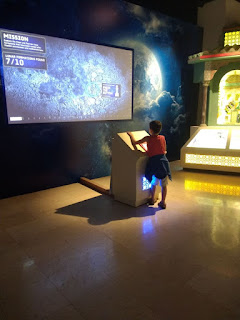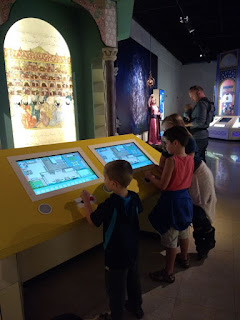Our friends arrived at 4.30pm, which is still lunch time in Jordanian culture, so we told them that is was Christmas lunch, not dinner. This year we decided to do a full Christmas meal for our local friends, since we are trying to grow more in sharing food and hospitality with people.
There were 14 people, including our family, so we had brought the breakfast room table into the main area of the house to join with the dining table. This was the third Christmas meal we had cooked for our local friends, and the third turkey we had roasted in our oven.
In Jordan, lunch is not lunch unless there is rice. Food without rice is considered snack food, no matter how much of any other staple food is eaten. Therefore, we decided to cook some Jordanian style rice instead of roast potatoes. We cooked a Jordanian rice dish called 'Maglooba', which means 'upside down'. This is because the rice and vegetables are cooked together in a big pan and then turned upside down onto the serving plate. Turning such a big pan over is not easy, and needs 2 people to do it.
They thought the bread sauce and cranberry sauce were a bit strange but enjoyed the turkey meat and the mince pies and Chocolate log roll for dessert.
After the meal we served mint tea and espresso coffee, which always goes down well with Jordanians who normally drink small cups of very strong coffee, rather than large cups of coffee like most people in the UK.
We had a discussion about the Christmas traditions which relate to faith and the ones which are just secular. They saw the guitar in the corner of the room and asked if Paul could play something, so we sang a couple of Arabic songs that we know before they left.
There were 14 people, including our family, so we had brought the breakfast room table into the main area of the house to join with the dining table. This was the third Christmas meal we had cooked for our local friends, and the third turkey we had roasted in our oven.
In Jordan, lunch is not lunch unless there is rice. Food without rice is considered snack food, no matter how much of any other staple food is eaten. Therefore, we decided to cook some Jordanian style rice instead of roast potatoes. We cooked a Jordanian rice dish called 'Maglooba', which means 'upside down'. This is because the rice and vegetables are cooked together in a big pan and then turned upside down onto the serving plate. Turning such a big pan over is not easy, and needs 2 people to do it.
They thought the bread sauce and cranberry sauce were a bit strange but enjoyed the turkey meat and the mince pies and Chocolate log roll for dessert.
After the meal we served mint tea and espresso coffee, which always goes down well with Jordanians who normally drink small cups of very strong coffee, rather than large cups of coffee like most people in the UK.
We had a discussion about the Christmas traditions which relate to faith and the ones which are just secular. They saw the guitar in the corner of the room and asked if Paul could play something, so we sang a couple of Arabic songs that we know before they left.








